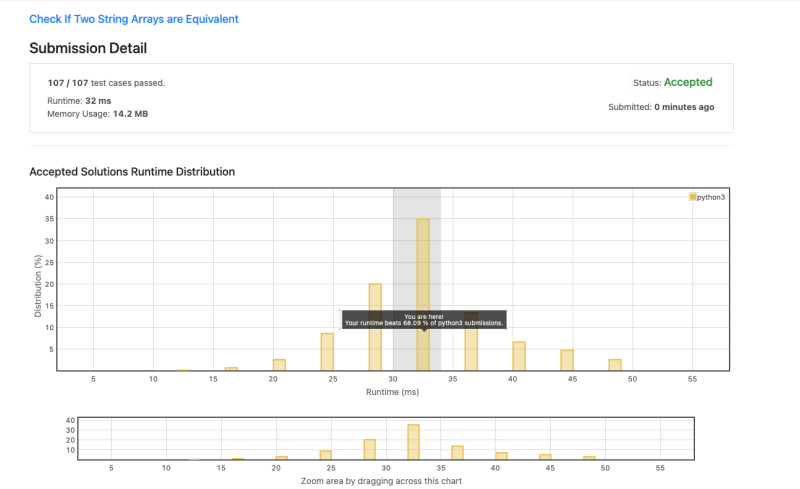The Problem
Given two string arrays
word1andword2, return true if the two arrays represent the same string, andfalseotherwise.A string is represented by an array if the array elements concatenated in order forms the string.
Example 1:
Input: word1 = ["ab", "c"], word2 = ["a", "bc"]
Output: true
Explanation:
word1 represents string "ab" + "c" -> "abc"
word2 represents string "a" + "bc" -> "abc"
The strings are the same, so return true.
Example 2:
Input: word1 = ["a", "cb"], word2 = ["ab", "c"]
Output: false
Example 3:
Input: word1 = ["abc", "d", "defg"], word2 = ["abcddefg"]
Output: true
Constraints:
1 <= word1.length, word2.length <= 10^31 <= word1[i].length, word2[i].length <= 10^31 <= sum(word1[i].length), sum(word2[i].length) <= 10^3-
word1[i]andword2[i]consist of lowercase letters.
My Tests
import pytest
from .Day8 import Solution
s = Solution()
@pytest.mark.parametrize(
"word1,word2,expected",
[
(["ab", "c"], ["a", "bc"], True),
(["a", "cb"], ["ab", "c"], False),
(["abc", "d", "defg"], ["abcddefg"], True),
],
)
def test_array_strings_are_equal(word1, word2, expected):
assert s.arrayStringsAreEqual(word1, word2) == expected
My Solution
from typing import List
class Solution:
def arrayStringsAreEqual(self, word1: List[str], word2: List[str]) -> bool:
return "".join(map(str, word1)) == "".join(map(str, word2))
Analysis
My Commentary
Not much to say about this one really. It's running in O(n). Not sure how to squeeze much more out of it.
We convert each list to a single string and compare them.




Top comments (2)
You can optimize for memory and a much better time complexity for best-case scenarios.
That's cool. Thank you!
I did a python version of it to test it out: